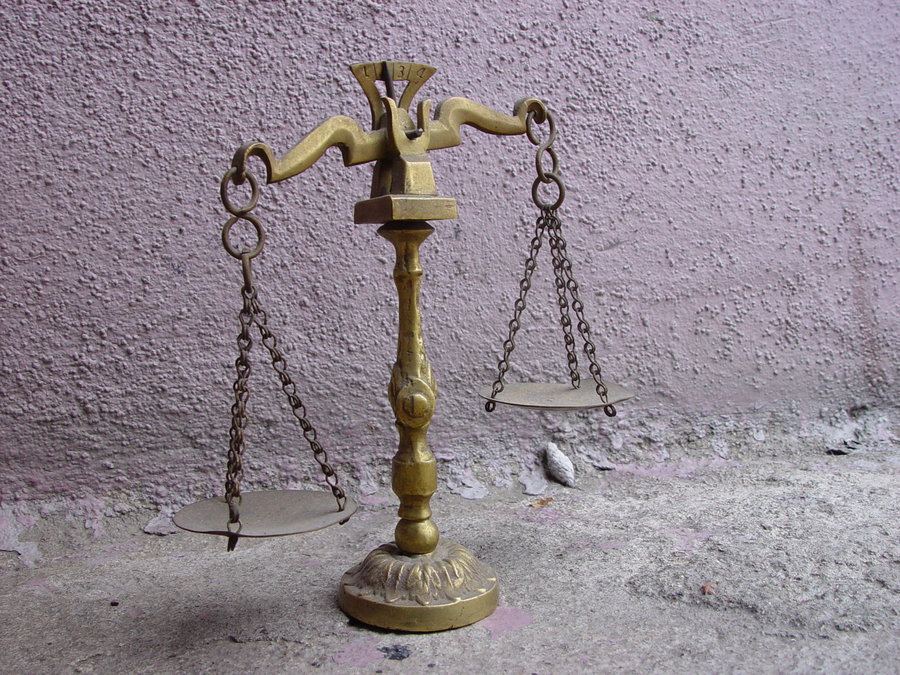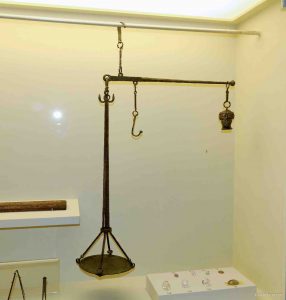For in the same way you judge others, you will be judged,
and with the measure you use, it will be measured to you. Luke 7:1-2
In the passage above about the “measure you use,” Jesus is using a classic rabbinic form of reasoning called midah keneged midah (mee-dah kah-NEG-ed mee-dah), literally meaning, “measure corresponding to measure.” This term was developed by later rabbis, but the idea comes up throughout the Old Testament and is found in the words of Jesus and Paul too. Knowing more about this expression and the logic behind it can give us insight on Jesus’ words, with implications for how we should live.
Measure for Measure
The rabbis from before Jesus’ time noticed that there was a pattern throughout the Scriptures that described how God dealt with sin, in that the consequences often fit the crime. Several places it says so explicitly:
Then say to Pharaoh, “This is what the LORD says: Israel is my firstborn son, and I told you, ‘Let my son go, so he may worship me.’ But you refused to let him go; so I will kill your firstborn son.” Exodus 4:22-23
Do not take advantage of a widow or an orphan. If you do and they cry out to me, I will certainly hear their cry. My anger will be aroused, and I will kill you with the sword; your wives will become widows and your children fatherless. Exodus 22:22-24
This idea that a person receives the effects of their sin back on themselves as punishment, measure for measure, was understood to be a basic principle of God’s justice. It is fascinating to see how often this pattern is found in many other accounts, woven subtly into the story.1 For instance:
Jacob deceived his father Isaac into giving him the birthright by substituting himself for his brother, taking advantage of his father’s blindness. In the same way, he was tricked when Leah was substituted for her sister on his wedding night and he couldn’t see her! Genesis 27; 29:23-25
Pharaoh commanded his people to drown the Israelite boys in the waters of the Nile. Later, his own army perished by drowning in the Red Sea in pursuit of the Israelites. Exodus 1:22; 14:28
Haman was angry with Mordechai for not bowing down to him and he built a gallows to have him hanged. He ended up being forced to lead Mordechai on a horse to honor him, and being hanged on his own gallows! Esther 5:9,14; 6:11, 7:10
We might smile at this “poetic justice,” and when we realize that it’s taking place, we see that events aren’t random, but that God in control. In the story of Jacob, it shows us that God didn’t condone Jacob’s deceitfulness, but let him suffer the consequences of a sin much like what he himself committed. Paul also talks about a general rule of paying the consequences for the choices we make:
Do not be deceived: God cannot be mocked. A man reaps what he sows. The one who sows to please his sinful nature, from that nature will reap destruction; the one who sows to please the Spirit, from the Spirit will reap eternal life. Galatians 6:7-8
We know that much of the time this is true – if we’re dishonest, we’ll get caught by our own lies, or if we are hateful, we’ll find ourselves being hated too. It’s just true that generally, what goes around, comes around in this life.
When Not to Use Measure-for-Measure
It might be a temptation, then, to assume that all problems in this life come from midah keneged midah—God giving us our just deserts for some sin in the past. But both the Old and New Testaments disagree with this. In the story of Job, his friends tell him that his suffering must be the punishment for some sin, applying this logic that God always repays the wicked for their sins. But when God finally appears, he is very angry with his friends, saying that they have not spoken of him rightly! (Job 42:8) The underlying message is that we should not use this logic on each other, to look for a reason why others suffer.
In fact, the Scriptures flip the idea of midah keneged midah on its head sometimes, threatening to use it against people who use it against others! In the case of the poor person coming to us for help, we might be tempted to refuse because he got into trouble from his own bad choices. But, the Scriptures say that when we do this, we invite God to ignore our problems, measure-for-measure:
He who shuts his ear to the cry of the poor
Will also cry himself and not be answered. Proverbs 21:13
Or as one 18th century rabbi put it,
When a poor man asks you for aid, do not use his faults as an excuse for not helping him. For then God will look at your offenses, and he is sure to find many.2
The quote above reminds us why we shouldn’t be hard-hearted to those who are suffering, even when it’s because of their own sins. We all are sinners, and for the most part, God does not deal with us as we deserve. He restrains his hand of judgment in this life and supplies our needs whether we deserve it or not—causing the sun to rise on the evil and the good, and sending rain on the righteous and the unrighteous. (Matthew 5:45) We should help those who don’t deserve it because God helps us when we don’t deserve it.
Like the rabbi above who reminds us that none of us is without sin, Jesus points this out when asked about the murder of some Jews in the Temple by Pilate:
Do you think that these Galileans were worse sinners than all the other Galileans because they suffered this way? I tell you, no! But unless you repent, you too will all perish. Or those eighteen who died when the tower in Siloam fell on them—do you think they were more guilty than all the others living in Jerusalem? I tell you, no! But unless you repent, you too will all perish. Luke 13:2-5
Jesus was saying that while people who suffer are not innocent, they are no worse sinners than the rest of us. We are just like them. None of us is in a position to judge, and God is showing mercy to all of us until the final day of judgment. Instead of looking for ways to blame those who struggle, we should examine our own lives, knowing that being comfortable is not necessarily a sign of God’s approval.3
Being Merciful, Measure-for-Measure
In what way, then, should we respond, measure-for-measure? God uses this logic in a different way that we can learn from. One might think that God would tell the Israelites that they should respond, measure for measure, to the ill-treatment that they got in Egypt by being cruel to the Egyptians in the future. But instead, he tells them to use the logic in another way—that just as they knew what it was like to be helpless aliens and slaves in Egypt, that they should empathize with all strangers who come into their land:
When an alien lives with you in your land, do not mistreat him. The alien living with you must be treated as one of your native-born. Love him as yourself, for you were aliens in Egypt. I am the LORD your God. Lev. 19:33-34
God points out that the people’s own hard past should teach them to care about others, particularly the alien, a traveler or refugee who usually had very few rights and was easily exploited. Even if an Egyptian were to come to Israel, the people’s response was to be loving, not vengeful, when they saw him as one who is in the same situation that they once were. In the same way, seeing others’ troubles, and knowing that it is only by grace that we aren’t in their place, should prompt us to come to their aid too. Instead of linking punishment to sin by measure-for-measure, we link our response to what we know God has done for us, measure-for-measure.
Perhaps this is also behind Jesus’ words about forgiveness:
Do not judge, and you will not be judged. Do not condemn, and you will not be condemned. Forgive, and you will be forgiven. Give, and it will be given to you. A good measure, pressed down, shaken together and running over, will be poured into your lap. For with the measure you use, it will be measured to you.” Luke 6:37-38
Like the Israelites, when we see the situation that we were in, and the condemnation that God has us set free from, the reasonable, expected response is that we extend that to others who are sinners like ourselves. Like the Israelites in Egypt, or like the debtor in the story of Matthew 18:23-35, we have been delivered at great cost through unfathomable mercy and are therefore called by God to extend that same mercy to those we encounter.
Let it never be said of us, “You wicked servant … I canceled all your debt because you begged me to. Shouldn’t you have had mercy on your fellow servant, just as I had on you?” Matt 18:32-33
1 Babylonian Talmud, Sanh. 90a, b. A major reference for this essay is the lecture, “Measure for Measure” by Joseph Frankovic, from the Centre for Study of Biblical Research.
2 Rabbi Shmelke of Nicholsberg (d. 1778), as quoted in Jewish Wisdom, by Rabbi Joseph Telushkin, 1994, William Morrow & Co, p. 15.
3 This is not to say that we should give to others without discernment, when our resources will be wasted and ultimately unhelpful. Rather than giving up, we should see if there are better ways to do so. On the subject of what Jesus said about suffering, see The Tsunami: Thoughts from Job and Jesus for more.
The legal ruling of “an eye for an eye and a tooth for a tooth” is another aspect of measure-for-measure. This legal principle was actually not interpreted as we hear it, and actually was an effort at moderating punishment and making it more fair. For more, see An Eye For an Eye.
Photos: St. Louis Circuit Attorney’s Office [CC BY-SA 4.0]


 The rabbis pointed out that this pattern of the punishment fitting the crime is a recurring theme throughout the Scriptures. Because Jacob deceived Isaac in his blindness into giving him the birthright, Jacob is fooled into marrying Leah when he is “blind” – when she is brought to him veiled, and in the night he doesn’t see his new wife. Or, because Pharaoh killed the Israelite boys by drowning them in the river, God defeated his army by drowning them too. Haman was hanged on the gallows that he prepared for Mordechai. The rabbis called this pattern “measure for measure” – midah keneged midah.
The rabbis pointed out that this pattern of the punishment fitting the crime is a recurring theme throughout the Scriptures. Because Jacob deceived Isaac in his blindness into giving him the birthright, Jacob is fooled into marrying Leah when he is “blind” – when she is brought to him veiled, and in the night he doesn’t see his new wife. Or, because Pharaoh killed the Israelite boys by drowning them in the river, God defeated his army by drowning them too. Haman was hanged on the gallows that he prepared for Mordechai. The rabbis called this pattern “measure for measure” – midah keneged midah. “Do not judge, and you will not be judged. Do not condemn, and you will not be condemned… For with the measure you use, it will be measured to you.”
“Do not judge, and you will not be judged. Do not condemn, and you will not be condemned… For with the measure you use, it will be measured to you.”